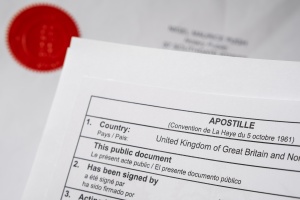In an interconnected world where people frequently move, study, work and do business across borders, the correct paperwork is essential. But one major hurdle remains: how do you ensure that a document from one country is legally recognised in another? This is where the apostille comes in. An apostille is a simple but powerful form of international certification.
Whether you are submitting a birth certificate to a foreign university or registering a company abroad, understanding the apostille process is key. In this post, we will break it down in clear terms, explaining what an apostille is, when it is needed and how to get one.
An apostille is a type of certificate that confirms that a document is legitimate and can be accepted abroad. Think of it as an official international stamp of approval, issued by a government authority. It is used to simplify the legalisation of documents that need to be recognised in another country.
Given the rise in international travel, trade and relocation, the apostille has become an essential tool for global document recognition.
Apostille Definition and Legal Background
The word apostille comes from the French verb apostiller, meaning ‘to annotate’ or ‘to certify’. While the term may sound complex, its purpose is simple: to certify the authenticity of a document so that it can be used legally in another country.
The concept originates from the Hague Convention, dated 5 October 1961, formally known as the ‘Hague Convention Abolishing the Requirement of Legalisation for Foreign Public Documents’. This international agreement established a standard method for validating public documents between all the countries party to the agreement, eliminating the need for lengthy embassy or consulate legalisation in many cases.
By streamlining the authentication process, the apostille helps to eliminate bureaucratic red tape and fosters trust in cross-border exchanges.
What an Apostille Looks Like
An apostille is a separate certificate attached to your original document. It verifies the signature, capacity and seal of the person or authority who signed or issued the document. Many countries’ standard apostille certificates contain translations of the section headers in several languages – in the UK, for example, the certificate is usually trilingual in English, French and Spanish.
The 10 Standard Fields of an Apostille:
- Country of origin
- Name of the person who signed the document
- The capacity in which the person signed the document
- The seal/stamp on the document
- Place of issuance
- Date of issuance
- Issuing authority
- Apostille certificate number
- Seal/stamp of the issuing authority
- Signature of the issuing officer
Country Variations
While the format is standardised, the appearance can vary slightly by country. In the UK, apostilles are issued by the Foreign, Commonwealth & Development Office (FCDO) and typically include a printed certificate with an embossed seal or sticker. The apostille certificate can be stapled, affixed with a ribbon or glued to the back of the original document.


Purpose of an Apostille
The main goal of an apostille is to make a document legally recognised abroad without needing further authentication.
It applies to a broad range of documents, including:
- Personal: birth, marriage and death certificates; academic transcripts
- Legal: power of attorney, court documents
- Commercial: certificates of incorporation, contracts and business licenses
Apostille vs. Notarisation
- Notarisation: Performed by a Notary Public to verify the authenticity or signing of a document, primarily for domestic use. Sometimes needs to be performed prior to obtaining an apostille for documents that cannot be apostilled directly.
- Apostille: Issued by a government agency to certify the notary or official issuing the document for international recognition.
Typically, only documents issued or signed by government authorities or legal professionals can be apostilled; documents not issued by a government authority must be notarised first before they can receive an apostille. In this case, it is the notarisation certificate that gets apostilled, rather than the document itself.
When Is an Apostille Needed?
You will typically need an apostille when you are sending public or official documents between two countries that are party to the Hague Convention. Common scenarios include:
For Individuals:
- Applying for a visa or dual citizenship
- Getting married abroad
- Studying at a university abroad
- Proving qualifications for overseas job applications
For Businesses:
- Opening a bank account abroad
- Registering a company in another country
- Signing cross-border contracts
- Applying for export certificates
Documents That Commonly Require Apostilles:
- Birth and death certificates
- Degrees and diplomas
- Criminal record checks (e.g. UK ACRO/DBS)
- Company registration certificates
- Powers of attorney
The Apostille Process in the UK
Prepare the Document
- Ensure it is an original or certified copy.
- If required, have it notarised by a UK Notary Public.
Submit to the FCDO
- Send your document to the FCDO Legalisation Office via post or an authorised provider.
- Use the official UK Government Legalisation Service.
Payment and Service Selection
- Choose between standard (usually 2–5 working days) and express/same-day services (available through some providers).
Receive the Apostilled Document
- The apostille is attached and returned by post or courier.
Key Notes:
- The FCDO is the only official body that can issue apostilles in the UK.
- Be wary of unofficial services that overcharge without adding value.
Verification and Authentication
Each UK apostille contains a unique certificate number that can be verified online for authenticity. This ensures that foreign authorities can trust the document.
To check a UK apostille, visit the official site:
🔗 https://www.gov.uk/verify-apostille
Enter the certificate number and issue date to confirm its validity.
Countries That Accept Apostille Certificates
Hague Convention Member States
Over 120 countries are members of the Hague Apostille Convention, including:
- United States
- United Kingdom
- Australia
- France
- Germany
- Spain
- India
These countries accept apostilled documents without requiring further legalisation.
Non-Member Countries
For countries not party to the Hague Convention (e.g. UAE, China, Egypt, Thailand), an apostille alone is not enough. In these countries, an apostille may not be accepted at all, or they might require an additional certification in addition to the apostille, such as notarisation or consular legalisation (through the country’s embassy, consulate or government office).
Always check the specific document requirements of the destination country.
Frequently Asked Questions
Can an apostille be rejected?
Yes. If the destination country requires additional legalisation or if the document is not correctly notarised or submitted, it may be rejected. Always verify local requirements.
What happens if the country is not party to the Hague Convention?
You will need to go through the full legalisation process, which often includes:
- Notarisation
- Apostille
- Embassy or consulate authentication
Does notarisation replace an apostille?
No. Notarisation verifies the document within the country, while an apostille certifies it for international use. Only documents issued, signed or stamped by government officials can be apostilled, so other documents will require notarisation first and then an apostille of the notarisation certificate.
Can I get an apostille for electronic documents?
Yes, in some cases. The UK now accepts certain electronic documents (e.g. digitally signed PDFs) for apostille certification. However, not all documents qualify, and not all countries accept e-documents.
Why Use a Professional Service?
Navigating document legalisation can be confusing and time-consuming. Using a trusted apostille or legalisation service offers several benefits:
- Speed: Many providers offer same-day or express turnaround.
- Accuracy: Avoid errors that could delay or invalidate your submission.
- Peace of Mind: Expert guidance through the notarisation and apostille process.
- Courier Delivery: Secure return of sensitive and valuable original documents.
For individuals and businesses alike, professional services can save time, reduce stress, and ensure that documents are accepted the first time.
The apostille may seem like just another bureaucratic requirement, but it plays a critical role in global mobility and business. Whether you are expanding abroad, moving overseas or proving your credentials internationally, understanding how apostilles work will save you time and potential headaches.
When in doubt, always check the requirements of the destination country and consider using expert help to ensure that the process goes smoothly.
Need help getting an apostille?
Start by checking gov.uk or consult a trusted legalisation service for a faster, stress-free experience.
Need translation plus apostille?
As an Accredited Member of the Association of Translation Companies (ATC), Business Language Services has been providing certified translation services for over 30 years. We regularly translate all kinds of certificates and legal documents requiring certification and offer all four main types of certification, including apostille. We can help you with every step of the process to ensure that your translation meets the legal requirements of the country and purpose for which you need it.

